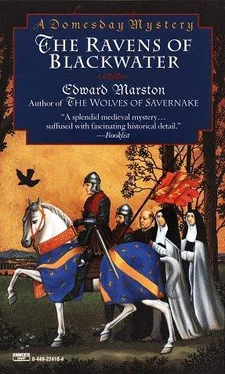Edward Marston - Ravens Of Blackwater
Здесь есть возможность читать онлайн «Edward Marston - Ravens Of Blackwater» весь текст электронной книги совершенно бесплатно (целиком полную версию без сокращений). В некоторых случаях можно слушать аудио, скачать через торрент в формате fb2 и присутствует краткое содержание. Год выпуска: 0101, Жанр: Исторический детектив, на английском языке. Описание произведения, (предисловие) а так же отзывы посетителей доступны на портале библиотеки ЛибКат.
- Название:Ravens Of Blackwater
- Автор:
- Жанр:
- Год:0101
- ISBN:нет данных
- Рейтинг книги:4 / 5. Голосов: 1
-
Избранное:Добавить в избранное
- Отзывы:
-
Ваша оценка:
- 80
- 1
- 2
- 3
- 4
- 5
Ravens Of Blackwater: краткое содержание, описание и аннотация
Предлагаем к чтению аннотацию, описание, краткое содержание или предисловие (зависит от того, что написал сам автор книги «Ravens Of Blackwater»). Если вы не нашли необходимую информацию о книге — напишите в комментариях, мы постараемся отыскать её.
Ravens Of Blackwater — читать онлайн бесплатно полную книгу (весь текст) целиком
Ниже представлен текст книги, разбитый по страницам. Система сохранения места последней прочитанной страницы, позволяет с удобством читать онлайн бесплатно книгу «Ravens Of Blackwater», без необходимости каждый раз заново искать на чём Вы остановились. Поставьте закладку, и сможете в любой момент перейти на страницу, на которой закончили чтение.
Интервал:
Закладка:
“May I see them, Reverend Mother?”
“Please do.”
“Our library is expanding,” said Gunnhild, picking up the books one by one in her pudgy fingers to examine them. “These are exceptional gifts. I look forward to being able to peruse these works in detail. They are suitable additions to our stock and will guide the minds of our holy sisters in the right direction. Especially Sister Lewinna.”
“Sister Lewinna?”
“I caught her reading Aesop’s Fables again.” “That is no disgrace. I donated the copy myself.” “Sister Lewinna was laughing.”
“Aesop has a strong sense of humour.”
“There is no place for laughter here,” said Gunnhild earnestly. “I had to impress that upon Lewinna. She still has much to learn. Aesop was no Christian and his tales of animals may lead a lighter mind astray.”
Prioress Mindred did not entirely agree but she had no wish to take issue with Sister Gunnhild. The library helped to shape the character of the nuns. Lady Mindred was an educated widow who had presented an English translation of Aesop because she felt its harmless stories embodied eternal truths about the human condition. Gunnhild was a cultured nun who had read the author in the original Greek and found it streaked with a levity she thought unbecoming. It was one small instance of the differences that existed, at a deep and largely unacknowledged level, between the two women.
There was work to do. During her absence, the prioress had left all the administrative chores to Gunnhild but she now had to take up the reins herself. It was time to go through the priory account book, a volume of such functional solemnity that it was in no danger of provoking Aesopian amusement. As Gunnhild took her place at the table beside her prioress, she touched on a subject that had caused her deep anxiety.
“Sister Tecla has told me of your ordeal,” she said. “It was most unfortunate.”
“The world is not safe when holy nuns can be set upon by a band of
robbers. I beg of you not to stir from here again unless it be with a larger escort.”
“The journey was imperative, Sister Gunnhild.” “I appreciate that.”
“And we did have the strong arm of St. Oswald to guard us on our way home. He saved our lives.” “God bless the noble saint!” “Honest men came to our rescue.” “So I heard from Sister Tecla.”
“They were kind and considerate to us,” said Mindred as she recalled me commissioners. “I am a true Saxon with a natural fear of Norman soldiers but nobody could have offered us finer protection or more congenial company.”
“Perhaps too congenial.” “Why do you say that?”
“Out of concern for Sister Tecla.” Gunnhild voiced her criticism in tones of complete humility. “It is not for me to question your decisions, Reverend Mother, because my duty is to obey at all times and I do so willingly. When these men came to your aid, it was natural for you to express your thanks and accept their protection. But Sister Tecla should not have been exposed to conversation with them. She took the veil to avoid the world of men and she was distressed by the closeness of their questioning.”
“She did not complain to me.”
“Sister Tecla preferred to suffer in silence.” “Is that what she told you, Sister Gunnhild?”
“Not in so many words,” admitted the other, “but that is what has emerged. I saw the young man who brought you back to the priory. He troubled her. I sensed it. He helped her down from her horse too readily.”
“Only after he had helped me,” said the prioress. “His name is Gervase Bret and he was charming.”
The word slipped out before she could stop it and it brought a momentary flash of disgust into Gunnhild’s eyes.
“Charming?” she repeated dully.
It sounded like an obscenity on her lips and had even less place in a convent than a copy of Aesop’s Fables. Yet another hidden difference between the two of them had briefly surfaced. Although Mindred had committed herself totally to the religious life, she had not yet expunged all traces of her former existence. One word had proved that. She could still take pleasure in male company and find the attraction of a young man worth an admiring comment. It was inappropriate and she regretted it at once. To cover her embarrassment, she opened the account book and pretended to read through the latest entries.
Sister Gunnhild was able to apply some gentle pressure. “We must do all we can to help Sister Tecla over this.”
“I will pray with her.”
“It may take more man prayer, Reverend Mother.’’
Prioress Mindred could see what she was being asked. Sister Gunnhild was in an attitude of submission but she was still applying tender force. Her exaggerated humility could be a strong weapon and the prioress was for once unable to deflect it by asserting her own authority. A silent battle of power went on for a couple of minutes before Mindred eventually capitulated.
“Very well,” she said. “You must look after her.”
Sister Gunnhild was content.
Ralph Delchard took a cheerfully irreverent view of those in ecclesiastical office and it made his relationship with men like Canon Hubert one of fluctuating tensions. As a Norman soldier whose life had been shaped by victory on the field of battle, he also had a haughty dis-regard for the conquered Saxons and considered their language, customs, and appearance to be markedly inferior to those of his own nation. Oslac the Priest disarmed him completely. Here was an ecclesiastic whom it was impossible to deride and a Saxon whom it was difficult to dislike. Ralph could not but admire the man’s bearing, forthright manner, and ability to look anyone in the eye. He had none of the awkward deference or dumb insolence of his compatriots. Conquest had not subdued him in any way. It had simply altered the circumstances in which he lived. Oslac had the kind of flinthard integrity that no invading army could destroy.
They walked the short distance from the shire hall to the Church of All Souls’ and found the priest alone in his vestry. The town reeve had told them that the body of Guy FitzCorbucion lay in the mortuary chapel. It was enough to take Ralph Delchard and Gervase Bret there in search of information about the murder. They introduced themselves to Oslac and were given a cordial welcome. Although he had not been at the meeting, the priest seemed to know everything that had transpired in the shire hall that afternoon.
“You have given the people of Maldon some hope,” he said affably. “That is a rare commodity in this town.”
“We are here to dispense justice,” said Ralph.
“That, too, has been in short supply of late.” He waved them to the bench, which stood against the wall in the little vestry, then waited till they were seated. “How may I help you?” he offered.
“We are interested in this case of murder,” said Ralph.
“So is the whole town, my lord. Guy FitzCorbucion was a forceful young man. He made his presence felt in every way. His death has set tongues wagging all over Maldon.”
“With delight, from what I hear.” “That is not for me to say.”
“Is the name of the murderer known?” “Not for certain, my lord.”
“Jocelyn FitzCorbucion seemed to think it was.”
“He was referring to the boy.” “What boy?”
“Wistan, son of Algar.” Oslac rested himself against the edge of the table and chose his words with care. “You will not need to be told that Blackwater Hall is the manor house of Hamo FitzCorbucion. He rules his demesne with firmness and his elder son, Guy, did like-wise in his absence. One of the slaves on the estate was stricken with the ague. I myself was called to Algar and tried to arrest his fever with medicines but his condition was too serious. A sick man is unable to work. He was reported to Guy FitzCorbucion.”
Читать дальшеИнтервал:
Закладка:
Похожие книги на «Ravens Of Blackwater»
Представляем Вашему вниманию похожие книги на «Ravens Of Blackwater» списком для выбора. Мы отобрали схожую по названию и смыслу литературу в надежде предоставить читателям больше вариантов отыскать новые, интересные, ещё непрочитанные произведения.
Обсуждение, отзывы о книге «Ravens Of Blackwater» и просто собственные мнения читателей. Оставьте ваши комментарии, напишите, что Вы думаете о произведении, его смысле или главных героях. Укажите что конкретно понравилось, а что нет, и почему Вы так считаете.












